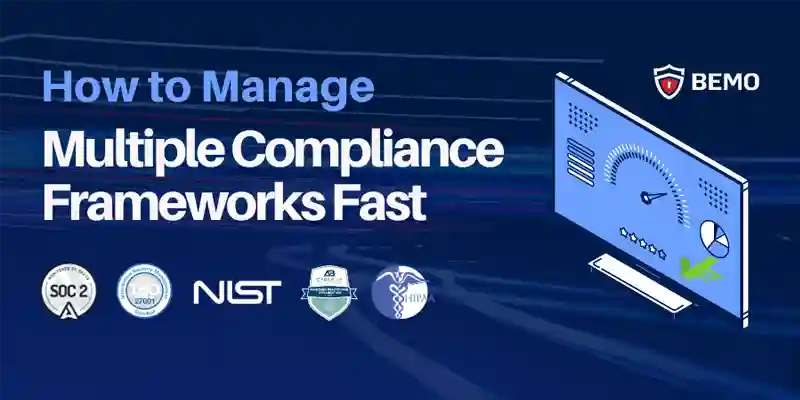
It is no surprise that 8 out of 10 customers expect your startup to have at least one compliance certification, if not multiple.
It's not just about appearances—it’s about trust and security. These certifications are a guarantee that their sensitive data is in capable hands with your small business, especially as the risks of cyber threats grow. In fact, the era of blind trust between partners is long gone, making compliance a critical asset in any startup's toolkit.
However, achieving compliance across multiple frameworks, like SOC 2, ISO 27001, HIPAA, CMMC, and NIST, can seem overwhelming. Is it really that hard to pull off, or is there a faster way to get compliant? Spoiler alert: there is.
In this article, you will learn how partnering with Compliance as a Service (CaaS) providers and leveraging compliance automation tools can streamline your journey, making it the fastest way to get compliant across multiple frameworks.
Why Startups Need to Demonstrate Multiple Compliance Frameworks?
For startups, compliance is more than just checking boxes. It’s a pathway to unlocking new market opportunities for your small business, and gaining trust, especially in industries where security is paramount.
For example, obtaining ISO 27001 certification can make your startup more attractive to international clients, as it is a globally recognized standard for managing information security. On the other hand, SOC 2 certification shows U.S.-based clients that your small business has rigorous internal controls in place to safeguard data.
Another critical reason to focus on compliance is resilience. Startups that adopt multiple compliance frameworks early on are better prepared for evolving regulations. Whether it's the new privacy laws or stringent cybersecurity requirements, having a flexible, compliant infrastructure puts your small business in a strong position to adapt and scale.
Furthermore, demonstrating a robust security posture through compliance reduces the likelihood of breaches, protecting both your startup's reputation and your customers' sensitive data.
Compliance Automation for SOC 2, ISO 27001, HIPAA, CMMC and NIST 800-171
When dealing with multiple frameworks, you might notice that many of the requirements overlap. For instance, SOC 2 and ISO 27001 share about 80% of their controls, making it possible to standardize procedures across both certifications. But without automation, managing these frameworks separately can be time-consuming, complex, and costly for a small business or startup.
By utilizing compliance automation tools, you can streamline these overlapping standards. Automation lets you set up shared controls that apply to multiple frameworks simultaneously, simplifying the compliance process. This is especially beneficial for fast-growing startups and small businesses that need to scale without being bogged down by manual compliance tasks.
For example, if you're aiming for SOC 2 and NIST 800-171 compliance, you can automate key security controls, such as access management, risk assessment, and audit logging. This approach not only reduces the manual workload but also ensures you're always prepared for an audit.
Real-Life Pairings of Compliance Frameworks
Different industries and small business models may benefit from specific combinations of compliance frameworks. Remember, every small business is different, do your research to understand which frameworks best suit your goals and needs.
- Healthcare Startups: Pairing HIPAA (Health Insurance Portability and Accountability Act) with SOC 2 ensures that sensitive health information is secure while meeting broader security and privacy standards. This combination is ideal for startups working with electronic health records, telemedicine platforms, or health apps.
- Government Contractors: For startups looking to work with the U.S. Department of Defense, CMMC (Cybersecurity Maturity Model Certification) is non-negotiable. Pairing it with NIST 800-171 ensures that you're meeting federal standards for protecting controlled unclassified information (CUI). This combination is critical for small businesses in defense, aerospace, or any sector that deals with government data.
- Tech Startups Expanding Globally: Combining SOC 2 and ISO 27001 is a strong move for tech startups dealing with cloud-based solutions, SaaS, or data centers that cater to both domestic and international clients. ISO 27001 allows them to gain the trust of global customers, while SOC 2 helps meet the expectations of U.S.-based clients, especially those in finance or technology sectors.
- Financial Startups: SOC 2 combined with ISO 27001 or HIPAA, depending on the nature of the data being handled, can help financial startups navigate regulatory waters. For those dealing with financial health data, such as insurance companies or fintech firms, HIPAA may also be necessary.
Startups no longer have to view compliance as a lengthy or complex process.
By leveraging compliance automation and managed compliance services, you can get certified across multiple frameworks faster than ever before. Whether you're aiming for SOC 2, ISO 27001, HIPAA, CMMC, or NIST 800-171, adopting a streamlined approach will position your business for growth, security, and success.
In conclusion, don’t wait until compliance becomes a burden. Take a proactive approach today, if your small business cannot sustain an in-house compliance team, there are alternatives like partnering up with a managed compliance provider. Look for one that specializes in working with small business.
Not only will it save you time and money, but it will also set your startup apart as a trusted, secure partner in the eyes of your customers.
Top 10 Posts
-
Google Workspace to Office 365 Migration: A Step-by-Step Guide
-
Office 365 MFA Setup: Step-by-Step Instructions
-
How to Migrate from GoDaddy to Office 365
-
Migrate From Gmail to Office 365: 2024 Guide
-
CMMC Meaning : A Comprehensive Guide for Startups
-
How to remove Office 365 from GoDaddy (tips and tricks)
-
What is Microsoft Purview ? Your A to Z Guide to Getting Secure Fast
-
What is The CIA Triad?
-
How to Set Up Office Message Encryption (OME)
-
What are the 4 types of Microsoft Active Directory?


Leave us a comment!